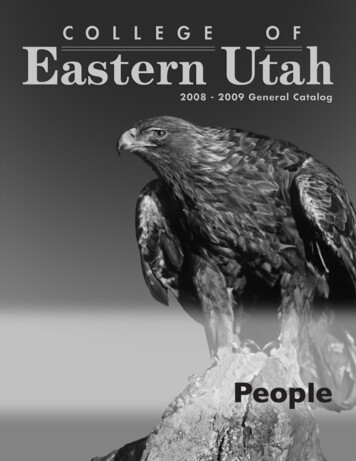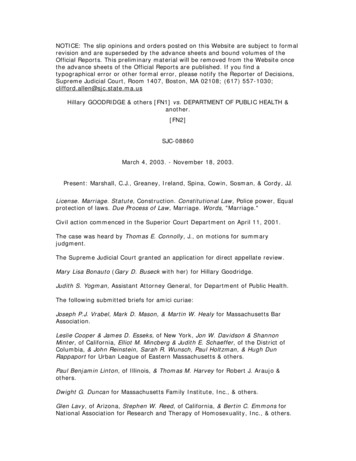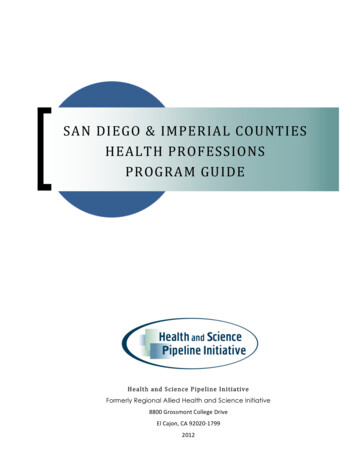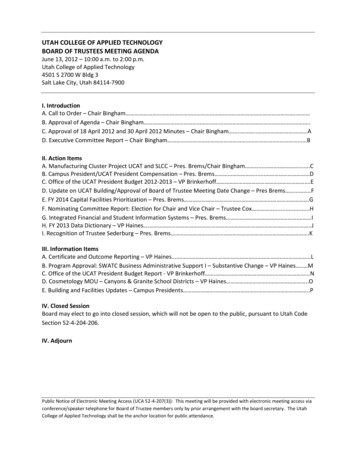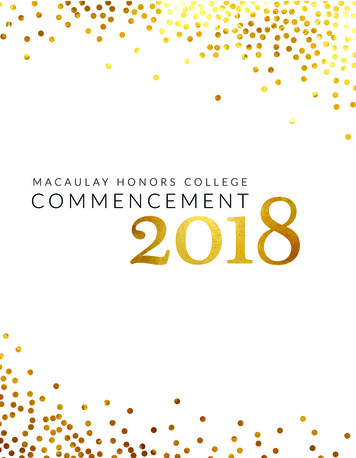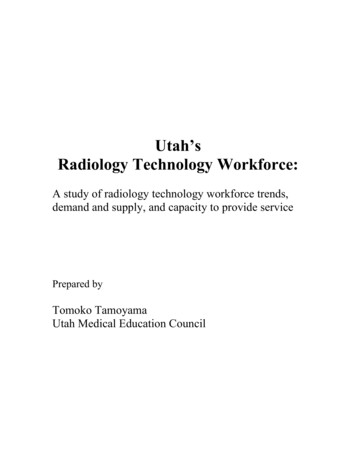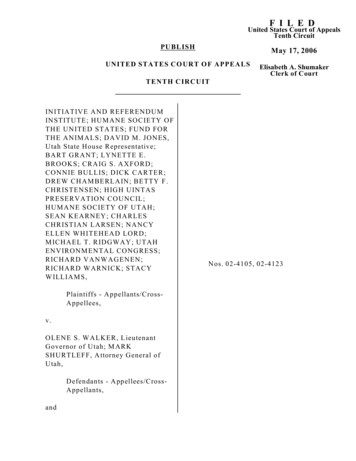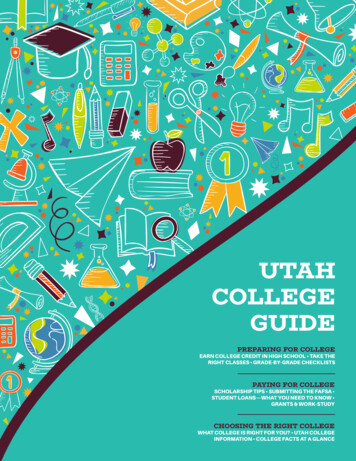
Transcription
UTAHCOLLEGEGUIDEPREPARING FOR COLLEGEEARN COLLEGE CREDIT IN HIGH SCHOOL TAKE THERIGHT CLASSES GRADE-BY-GRADE CHECKLISTSPAYING FOR COLLEGESCHOLARSHIP TIPS SUBMITTING THE FAFSA STUDENT LOANS—WHAT YOU NEED TO KNOW GRANTS & WORK-STUDYCHOOSING THE RIGHT COLLEGEWHAT COLLEGE IS RIGHT FOR YOU? UTAH COLLEGEINFORMATION COLLEGE FACTS AT A GLANCEUTAH COLLEGE GUIDE 1
TABLE OF CONTENTS1Do high school rightUse high school to preparefor college.5Career andTechnicalEducation36College OpportunityWhat is college?Preparing for collegeTake the right classes.2010Grade-by-gradechecklistsWhat to do and when to do it.For more information, visit us atUtahFutures.org or @UtahFutureson social:Utah College DirectoryChoosing a college.
TABLE OF CONTENTS27Types of collegesDifferent colleges servedifferent purposes.29Colleges in UtahNo matter where you are,there’s a college nearby.31Paying for collegeIt’s possible.34Tips for findingscholarshipsWhere to findscholarships andhow to apply.37Financial aidinformationWhat kinds of financialaid are there?Yes, you can go to collegeif you are undocumented!5 things undocumented studentsneed to know.43
DO HIGH SCHOOL RIGHTUse high school to prepare for college.DID YOUKNOW?Most colleges in Utah are openadmission, meaning if you have ahigh school diploma and submit anapplication, you’ll be accepted. Withopen-admission colleges, you don’thave to worry about getting in—butyou should do all you can in highschool to prepare academically forcollege. Taking the right classes inhigh school can help you save moneyon future tuition costs and may helpyou earn scholarships.Admissions requirements: Somecolleges have specific admissionsrequirements. They will ask you to takeclasses beyond what you need forhigh school graduation. You may evenneed a certain ACT/SAT score or GPAto be admitted.For more informationon college admissions,see the Utah collegeinformation, beginningon pg. 20.1 UTAHFUTURES.ORGDO HIGH SCHOOL RIGHT
Whatcollegeis rightfor you?What is yourdream job?Find out what interests you mostby taking the Career InterestProfiler at UtahFutures.org.What kind ofcertificate or degreewill get you to yourdream job?Visit UtahFutures.org/programs/search tofigure out which colleges offer the programto get you where you want to go.What type of collegecampus is best for you? Close to home or far awayBig city or small townSmall college or large universityLive in the dorms or off campusThe best way to know if a college campus is right foryou is to visit colleges you’re interested in.Find Utah college tour information atUtahFutures.org.What advicedo your family,friends, andcommunityhave for youabout college?UTAH COLLEGE GUIDE 2
COLLEGE OPPORTUNITYWHAT IS COLLEGE?Certificates, Associate degrees, Bachelor’s degreesMost jobs today require college education beyond high school. Think of collegeas one year, two years, four years, or more: college certificates can be earnedin one year or less, associate degrees in two years, bachelor’s degrees in fouryears, and graduate degrees in more than four years. The chart below shows howcollege credentials can build on each another to get you where you want to go.High School DiplomaConcurrent Enrollment, AP, IB classesCareer and Technical reeGraduateDegreeCareer Field3 UTAHFUTURES.ORGCOLLEGE OPPORTUNITY
High School DiplomaProvides foundational skills for successin life, college, and the workplace.Examples: High school Career and Technical Education College-prep classes Work-based learning1 2 4 Certificates andother CredentialsAssociate DegreesBachelor’s Degrees1 year or less2 years4 yearsProvides basicpreparation forspecific jobs andcareers. Programscan typically becompleted in a fewweeks to one year offull-time attendance.Examples: Certificates ofProficiency Certificates ofCompletion Apprenticeships Licenses ProfessionalCertificationsTypically 1–6 yearsbeyond a bachelor’sdegreeProvides preparationfor employment or abachelor’s degree.Programs can typicallybe completed in twoyears of full-timeattendance.Provides a wellrounded educationfor success in a careeror for graduate study.Programs can typicallybe completed in fouryears of full-timeattendance.Provides advancedpreparation in avariety of careers thatrequire educationbeyond a bachelor’sdegree. Programs cantypically be completedin one to six years offull-time attendance,depending on the fieldof study.*Examples: Associate of AppliedScience Associate of Science Associate of ArtsExamples: Bachelor of Science Bachelor of Arts Bachelor of AppliedScience ProfessionalBachelor’s DegreeExamples: Master’s degrees Doctoral degrees Graduate CertificatesThereare twotypes ofassociatedegrees:COLLEGE OPPORTUNITYGraduate andProfessional Degreesand CredentialsAssociate of Applied ScienceThis degree provides basic preparation and relatedinstruction for career development and entry into the jobmarket, and in some cases for bachelor’s degrees.Associate of Science and Associate of ArtsThis degree provides the first two years of a bachelor’sdegree and can be earned at a community college andthen transferred to a university.UTAH COLLEGE GUIDE 4
CAREER AND TECHNICAL EDUCATIONCareer and Technical Education (CTE)programs are great ways to earn acollege certificate or degree andprepare for a good career. Collegesoffer CTE certificate and associateprograms in all regions of the state,so you won’t have to go far to earn acollege credential.Many certificates or associate degreesthat you can earn through CTEprograms build into and count towardbachelor’s degree programs if youdecide to go further in your education.CTE can fast-track your career andhelp you earn more money sooner asyou progress through college or yourcareer.5 UTAHFUTURES.ORGThere are CTE programs in healthcare, business, computer technology,engineering design, multi-media,advanced manufacturing, aerospace,homeland security, and many otherfields.CTE courses and programs are offeredat Utah State University, Weber StateUniversity, Salt Lake CommunityCollege, Utah Valley University, SnowCollege, Southern Utah University,Dixie State University, and at techcolleges across the state (see the mapon pg. 29-30).Contact colleges’ admissions officesto learn more or visit UtahFutures.org/schools/search.COLLEGE OPPORTUNITY
PREPARING FOR COLLEGETake the right classes.You can go to college no matter which classes you take in high school. But, to be bestprepared for college, try to take the following classes in grades 9-12. They can help youearn better grades in college and can increase your score on the ACT (which helps withcollege admissions and scholarships).If you are interested in playing college sports, be sure to check out NCAA guidelines atncaa.org. You will have to take specific classes in high school to be eligible.ENGLISH: 4 creditsMATH: 4 creditsMath I, II, and III, plus one class beyond Math IIISOCIAL SCIENCE: 3 creditsSCIENCE: 3 creditsLab-based, specifically biology, chemistry,and physicsLANGUAGE: 2 creditsof the same languageTake the right classes to double your odds of completing college,get better scores on the ACT, and prepare for scholarships.PREPARING FOR COLLEGEUTAH COLLEGE GUIDE 6
EARN COLLEGE CREDIT WHILE INHIGH SCHOOLThere are three ways to earn college credit in high school. This is a great way to get a head start onyour college education, plus it’ll save you time and money. Talk with your counselor to see whichclasses your high school offers.When earning college credit in high school, talk with your counselor to make sure you’re earningcredit that counts for either general education or toward your major at the college you plan to attend.ADVANCEDPLACEMENT (AP)INTERNATIONALBACCALAUREATE (IB)CE classes earn highschool and collegecredit at the sametime.AP classes arewriting- and researchintensive andemphasize study andtest-taking skills.IB classes are writingand research-intensive.IB students alsoperform communityservice and write anextended essay.Where is itavailable?Available at mostUtah high schoolsAvailable at mostUtah high schoolsOnly offered at certainUtah high schoolsCollegecreditearnedthrough:Passing the classExam scoreExam score 93 per exam Possible book costs 116 per exam Possible book costsVaries with eachcollege—checkwith your college’sacademic advisorVaries with eachcollege—checkwith your college’sacademic advisorCONCURRENTENROLLMENT (CE)What is it?Cost:**based on costsfor the 2019-20school year;costs may varyby high schoolWhatcollegecredit willI earn? 15-20 per class ( 5per credit) One-time applicationfee (varies by college) Possible book costsMany CE classes fulfillgeneral educationrequirements. CE alsooffers introductoryclasses in collegelevel career andtechnical education.7 UTAHFUTURES.ORGPREPARING FOR COLLEGE
What is a major? What is generaleducation?When you’re in college, you will selecta college major, which is the specificsubject area that you specializein. Typically, between one-third toone-half of your college classeswill be in your major or related to it.Some careers require a particularmajor, while others just ask for acollege degree (like an associate or abachelor’s), so you can choose a majorthat interests you the most.Visit UtahFutures.org/student toexplore your interests and identifypossible majors.PREPARING FOR COLLEGEIf you’re earning an associate orbachelor’s degree, you will be requiredto take several general educationclasses. General education allows youto explore a variety of subjects whiledeveloping critical thinking, writing,and problem-solving skills. No matterwhat major you decide, you’ll haveto take one or two classes in each ofthe academic disciplines like math,science, English, and history. You mayalso need to take general educationcourses in religion, intercultural/global,or a foreign language, depending onthe college you attend.UTAH COLLEGE GUIDE 8
TAKE MATH YOURSENIOR YEARIf you decide not to take math as a senior, you may be behind once youenter college because all college programs, except for some certificateprograms, require at least one math class. The good news? You mightbe able to fulfill that math requirement while you are still in high schoolthrough AP, IB, or Concurrent Enrollment (CE) classes.Depending on your major, a general education math class may be thelast math class you ever need to take. Taking college-level math in highschool can save money on future tuition costs. And it is easier to completecollege-level math and get a good grade when the math concepts you justlearned in high school are still fresh in your mind. Check with your highschool counselor to see if CE, AP, or IB math classes are options for you.A good way to earn your college math credit and save money is to takea CE class. These classes transfer from one Utah college to another, andmost Utah high schools offer CE math classes. Meet with your counselorto see which classes are available at your school and which class fits bestwith your future plans.Which CE math class should I take?Are you interested in .9 UTAHFUTURES.ORG English/languages Fine arts Humanities Performing artsTake CE Math 1030Intro to Quantitative Reasoning History Nursing Psychology Social SciencesTake CE Math 1040/STAT 1040Intro to Statistics Business Biology & physical sciences Engineering EducationTake CE Math 1050College AlgebraInterested in something else?Talk with your counselor aboutthe right CE math for you.PREPARING FOR COLLEGE
GRADE-BY-GRADECHECKLISTSWhether you’re considering a certificate, an associate degree, a bachelor’sdegree, or a professional/graduate degree, these grade-by-grade checklists willhelp you prepare to be successful after high school graduation! More detailedversions of these checklists can be found on UtahFutures.org/student.GRADE-BY-GRADE CHECKLISTSUTAH COLLEGE GUIDE 10
8THGRADETo see the complete grade-by-grade checklists, visit UtahFutures.org/studentStart the conversation now.Talk to a parent or other adult about what you like to do, what you’regood at, and what you want for your future.Learn about yourself.Explore careers through Sokanu on UtahFutures.org to learnwhere your strengths and interests lie.Take the Reality Check at UtahFutures.org.What are the grade-bygrade checklists?These grade-by-grade checklistsare designed to help you preparefor college during grades 8–12.We recommend spreading thesetasks out over your junior high andhigh school years, but you cancomplete most of these tasks atany time.Make your high school plan.Meet with your school counselor to develop a four-year highschool plan. Try to fit in the recommended classes on pg. 9.Prepare for high school classes.Some colleges require you to take certain classes. Be sure to research the admissions requirements at the collegesyou’re considering, including GPA, ACT/SAT scores, and specific high school classes they may require.Learn about the Regents’ Scholarship requirements at RegentsScholarship.org.Start saving for college.With the help of a parent or other adult, open a college savings account to save for your future. Consider a savingsaccount through a bank, credit union, or a my529 account. Learn more at my529.org.11 UTAHFUTURES.ORGGRADE-BY-GRADE CHECKLISTS
9THGRADETo see the complete grade-by-grade checklists, visit UtahFutures.org/studentDo high school right.Sign up for the UtahFutures newsletter at UtahFutures.org to get college preparation and scholarship tips.Meet with your school counselor and develop a four-year high school plan.Review the Regents’ Scholarship requirements at RegentsScholarship.org.Explore college options.Read through the information on Utah colleges at UtahFutures.org to discover what colleges in Utahmay be right for you.Talk with your parents, friends, and community members about their college experience, and startthinking about what you want out of yours.Get involved in your school and community.Volunteer experience and getting involved with after-school activities can boost your resume and potentially earnyou money for college, since some scholarships require a record of volunteer hours.Volunteer in your community. Find volunteer opportunities with U Serve Utah(userve.utah.gov) and United Way 2-1-1 (uw.org/211/volunteer).Sign up for at least one school club or after school program. Talk to your school counselor or a teacher aboutwhat opportunities are available.Learn about the different ways to pay for college.Read about the various ways to pay for college, including scholarships, grants, work-study, and student loans onUtahFutures.org.Make a plan to pay for college with your parents. For example, part-time work in high school and college can helpyou pay for college costs and start building your resume.Start to build a scholarship and college admissions resume to track your achievements. Use the scholarshiptoolkit at UtahFutures.org to get you started.With the help of an adult, open a college savings account. Learn more at my529.org. If you already have asavings account, contribute what you can to it.GRADE-BY-GRADE CHECKLISTSUTAH COLLEGE GUIDE 12
10THGRADETo see the complete grade-by-grade checklists, visit UtahFutures.org/studentStay involved and continue to explore your interests.Volunteer experience and getting involved with after-school activities can boost your resume and potentially earnyou money for college, since some scholarships require a record of volunteer hours.Continue to be involved in school clubs, after school programs, and volunteering. Track your volunteerhours using a spreadsheet.Sign up for the UtahFutures newsletter at UtahFutures.org to get college preparation tips and learnabout scholarship opportunities.Look into support and mentoring programs.Look through the Access Network Search at UtahFutures.org to see what support for your collegedreams you might be eligible for in your area, like AVID, TRiO, or GearUP programs.Think about what certificate or degree you will need for your future career.Read about the differences between a certificate, associate, bachelor’s, and other advanced degrees onUtahFutures.org.Use your Sokanu results from UtahFutures.org to see what college majors you might be interested in.Find those majors and the certificates and degrees Utah colleges offer by exploringUtahFutures.org/programs/search.Take the right classes.Meet with your school counselor to make sure you’re on track to complete Math III no later than the endof 11th grade.Ask your counselor about Advanced Placement (AP), International Baccalaureate (IB), and ConcurrentEnrollment (CE) classes available at your high school.13 UTAHFUTURES.ORGGRADE-BY-GRADE CHECKLISTS
Start preparing for the ACT.Study! Your ACT score will help determine your eligibility for some scholarships and acceptance intosome colleges.Get free ACT test prep materials at UtahFutures.org.Download the free ACT app to get daily ACT test prep questions.Research and apply for scholarships—yes, even before senior year!Make sure you’re on track for the Regents’ Scholarship. Check the details and contact a scholarshipspecialist at RegentsScholarship.org.Look for scholarships and apply to at least one this year. Keep your scholarship resume updated.Learn how much college costs.Use the net price calculators on the College Search at UtahFutures.org to estimate college costs.Keep saving for college.Add funds to your credit union, bank, or my529 savings account. If you haven’t opened a my529 collegesavings account, do so. Learn more at my529.org.GRADE-BY-GRADE CHECKLISTSUTAH COLLEGE GUIDE 14
11THGRADETo see the complete grade-by-grade checklists, visit UtahFutures.org/studentFocus on your classes.Sign up for classes that stretch your mind, like Honors classes and classes that can earn you collegecredit, such as Advanced Placement (AP), International Baccalaureate (IB), and Concurrent Enrollment(CE). Talk to your school counselor for more information.Verify with your counselor that you are taking classes that will help you succeed in college.Align your CTE pathway with your college plans.See how your high school CTE classes could apply to college-level CTE career pathways. Getting acertificate in a technical field can help you pay your way through college. Talk to your school counselorfor ideas.Think about what math class you’ll take your senior year.Meet with your counselor to make sure you pick the right math class for your future. It’s best to completeyour college math requirements through Concurrent Enrollment while still in high school.Read on pg. 9 about what CE math class best fits with your future plans.Take the ACT.Take the ACT in the spring. Get free ACT test preparation materials at UtahFutures.org or downloadthe free ACT app to get daily ACT test prep questions. A good ACT score can help you earn scholarshipmoney for college and determine your acceptance into some colleges.Consider your college options.Make a list of your top college choices and get ready to apply during your senior year. If you’re thinkingabout going to college in Utah, check out the information on Utah colleges on pg. 20-30 to learn more.Learn about the many ways to pay for college.Forecast how much financial aid you could qualify for by using the FAFSA4Caster at fafsa.gov.15 UTAHFUTURES.ORGGRADE-BY-GRADE CHECKLISTS
Get organized for your final year.Some colleges (and scholarships) require one or more letters of recommendation. Decide which teachersmight be willing to write letters of recommendation next year and ask them in advance.Get a job over the summer to set aside money for college and gain valuable experience you can add toyour resume.Research possible careers.Review your career interest profiles or take them again at UtahFutures.org.Job shadow at a business/organization that interests you. Check to see if you could do an internship,which provides you with great real-world experience.Talk to professio
3 Financial aid information What kinds of financial aid are there? TABLE OF CONTENTS. 1 UTAHFUTURES.ORG DO HIGH SCHOOL RIGHT . University, Salt Lake Community College, Utah Valley University, Snow College, Sout

